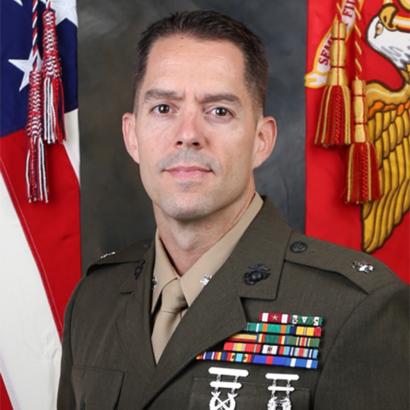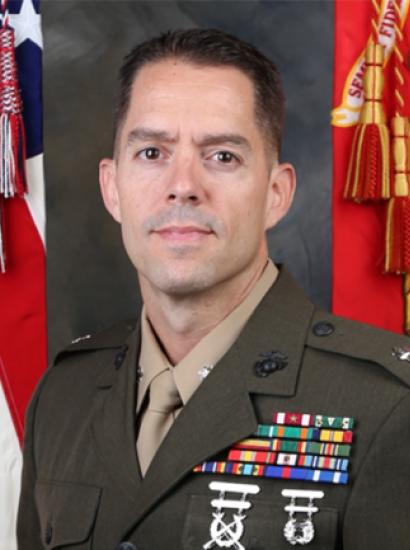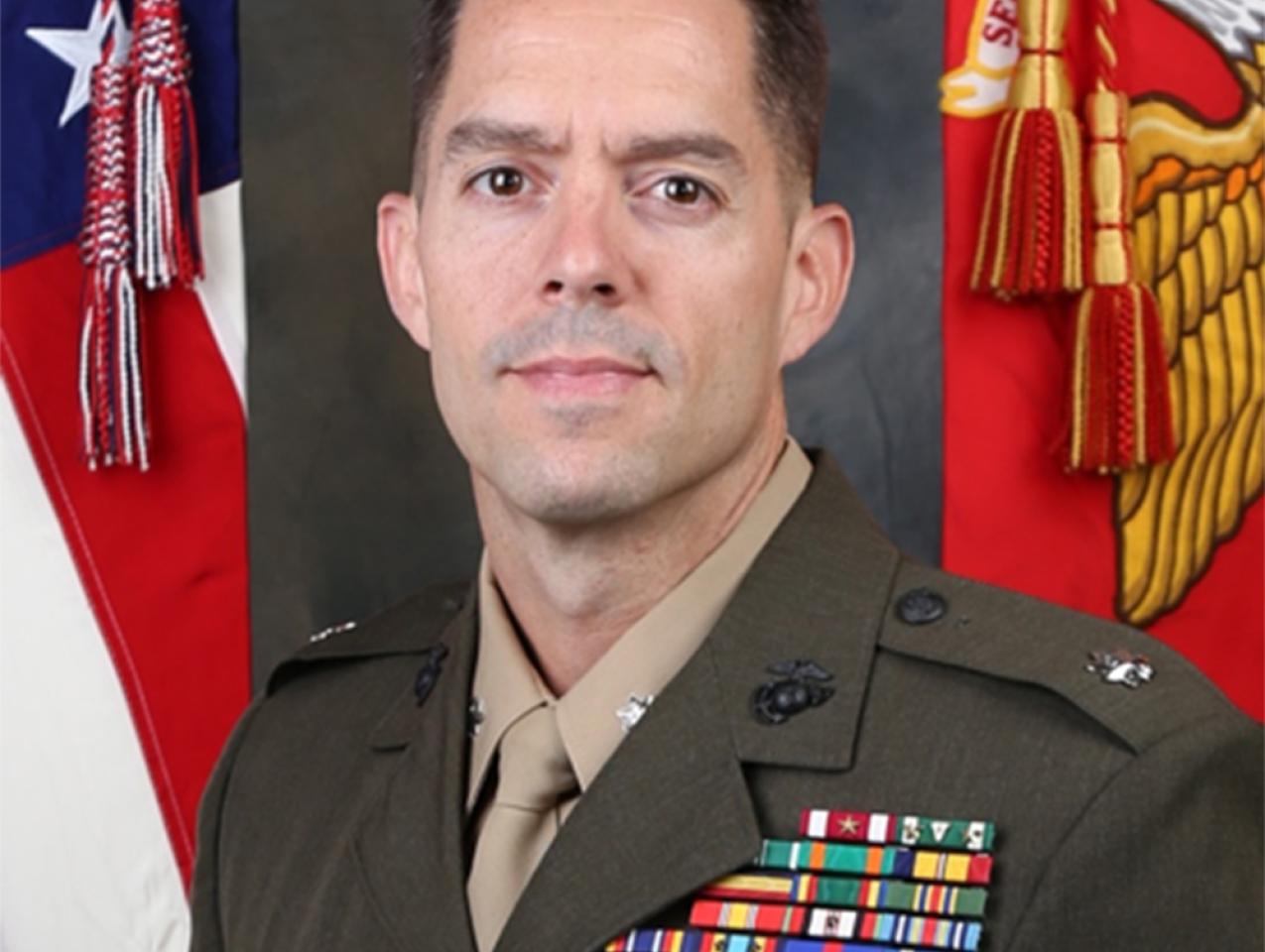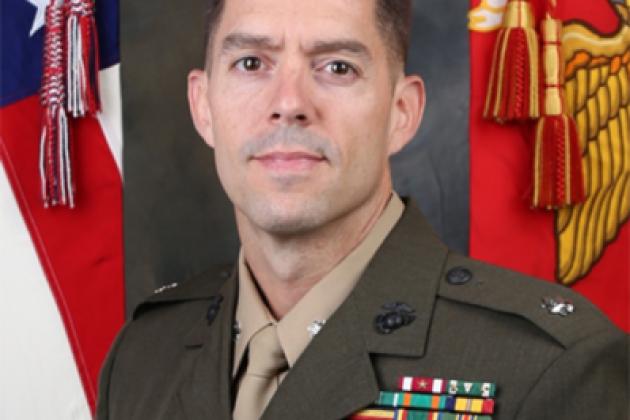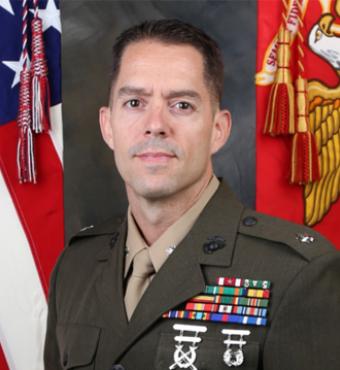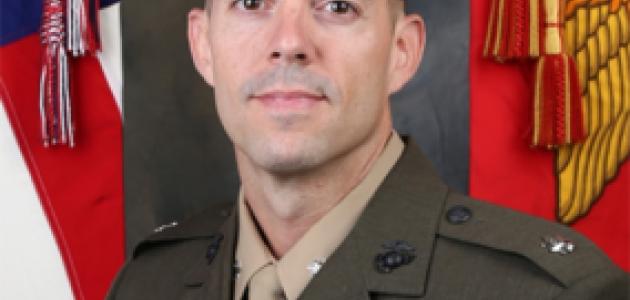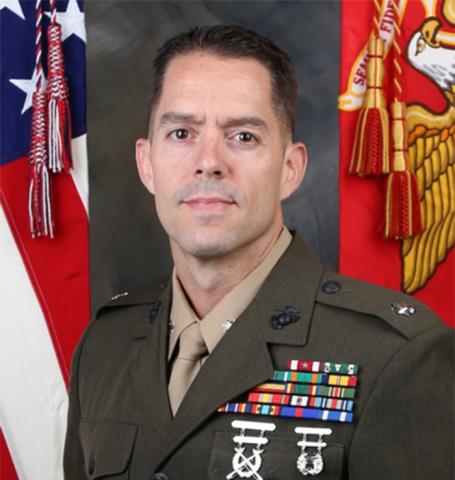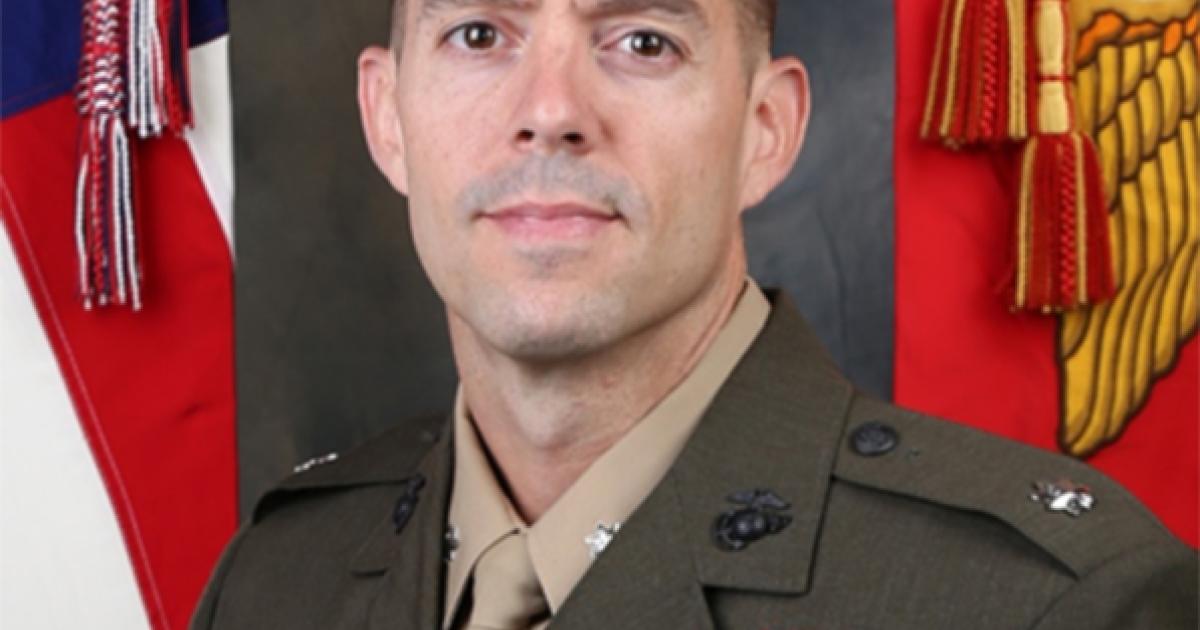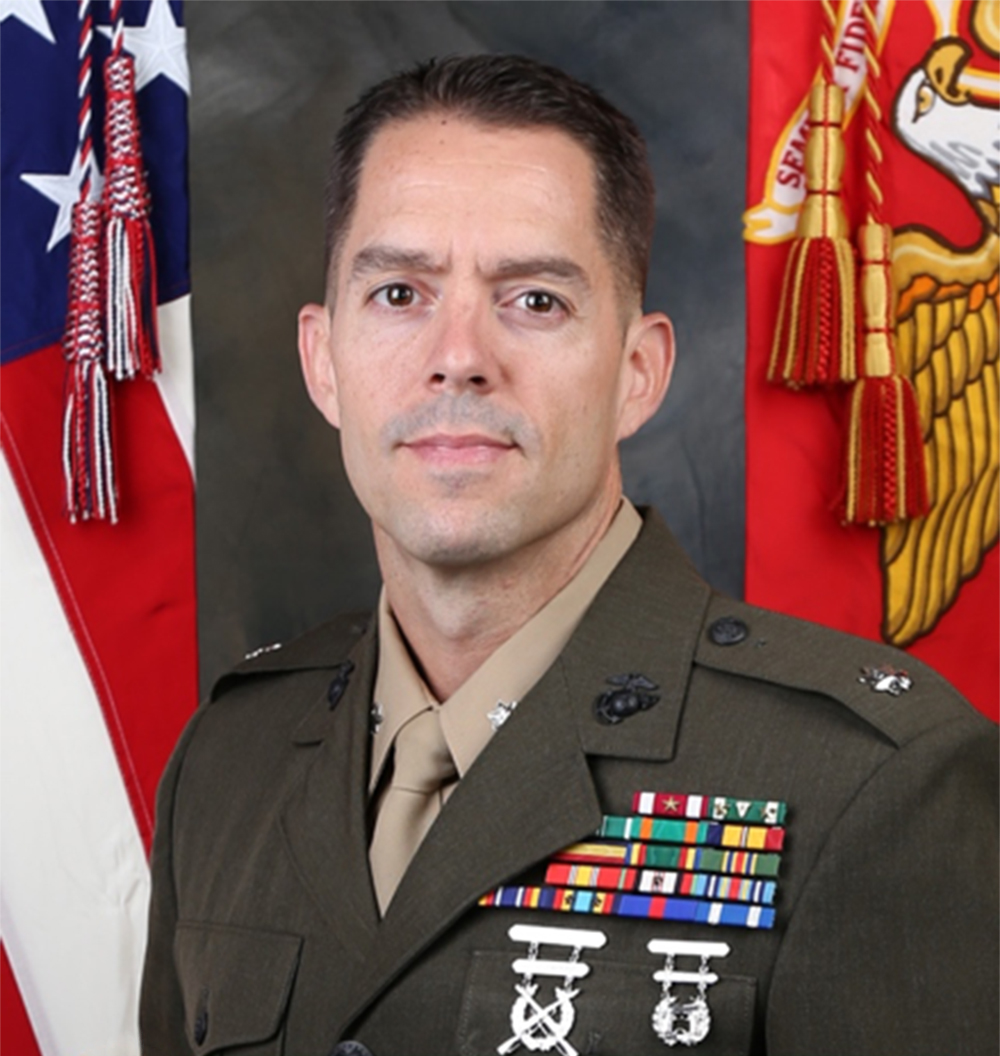
by Jonathan Movroydis
Lt. Col. Kenneth del Mazo, representing the US Marine Corps, is a National Security Affairs Fellow (NSAF) for the academic year 2020–21 at the Hoover Institution.
In this interview, del Mazo discusses his two-decade career in the US Marine Corps. He describes experiences including leading counterinsurgency operations in Afghanistan and working as an advisor to the Colombian marines, and outlines the importance of immigration in American life and in the US military.
Why did you decide to join the Marine Corps?
My Marine Corps story is very complicated, but I'll give you the CliffsNotes version. I knew I wanted to do something different after I graduated high school. I knew that I wanted to serve, I felt that pretty strongly, but I didn't know in what capacity. I also really wanted to play football. One day I received a letter from the Naval Academy, specifically from the football office. I started to pursue that option, and everything came together like a blessing.
I went to the prep school first, and that's when I was first exposed to the Marine Corps. I didn't know anything really about the Marine Corps except their uniforms were by far the coolest in the armed forces. I started getting exposed to Marines, and over my next five years, essentially the one year at the prep school and then the four at the Academy, I became more conditioned to the Marines while also playing football.
When football was wrapping up my senior year, I really started to think harder about my career. A lot of the people I looked up to at the Naval Academy, mentors and such, were Marines, and basically, they wouldn't let me go Navy. I don't want to say that convinced me, but it definitely influenced me to join the corps, and 20 years later here I am. I have been “getting out since I got in,” quite frankly, but for a lot of different reasons, I just keep going tour to tour and no regrets at all.
Can you tell us about your educational background?
I received a bachelor’s of science degree in political science, which is actually quite odd. The Naval Academy is an engineering school, so all midshipmen are required to take math, science, and engineering as part of their core curriculum. In 2005, I was an instructor at the Artillery School in Fort Sill, Oklahoma, and I had the opportunity to pursue a master's degree in public administration at the same time from the University of Oklahoma.
Then years later, I was accepted into the Marine Corps School of Advanced Warfighting, which is an advanced PME [professional military education] program, basically for majors. I received a master’s in operational studies from that school.
Could you tell us about the nature of your deployments to Iraq and Afghanistan?
During the initial invasion of Iraq in 2003, I was deployed to the Far East. However, beginning in 2004 my artillery battery put their howitzers away and we deployed as provisional infantry for seven months of convoy security throughout Al Anbar province.
During this tour, we would basically provide security escorts for third-country trucks delivering food, supplies, fuel, and other goods. These trucks weren't Iraqi necessarily, or American, they were from all over the Middle East. We protected them during their journeys from base to base across Al Anbar roads, from the Jordan-Iraqi border all the way to Ramadi, Fallujah, and other places.
I was deployed to Afghanistan from 2009 to 2010 as a commander for an artillery battery, and we ran the gamut. We conducted offensive operations in which we were firing our howitzers at the enemy. Oftentimes, shortly after we started firing these weapons, we would get the order to pack them away and go secure a main supply route, important checkpoint, or something of that nature. Looking back on this experience, I'm still in awe of the Marines’ ability to adapt in very difficult circumstances and shift from essentially operating in one specialty to another with very little notice. We would also conduct counterinsurgency operations the day after we were engaged in full combat for an offensive clearing operation.
Counterinsurgency was the overarching theme of my deployment to Afghanistan. When we first arrived, the local population was very skeptical of American forces. Villagers often enabled or allowed Taliban fighters to come into the area and conduct ambushes, or dig up IEDs [improvised explosive devices] or whatever the case may be. Six or seven months later, after we successfully engaged and persuaded the population that we were the good guys, they started telling us where the Taliban was coming from and provided the location of IEDs. Again, I was impressed by the Marines’ ability to build those important relationships and gain people's trust by doing the right thing and by protecting them from the Taliban. That’s an experience that I will never forget.
How do you build trust with people from a very different culture and persuade them that they should fight on the side of the United States?
That is an important question. I think what we did was just to try to demonstrate our character through our actions. At the beginning, when we would go out on patrol and engage and talk to Afghanis, they thought we were the Soviets that had returned to reconquer their country. This was in Southern Helmand Province, where illiteracy is widespread and there's no electricity or clean water.
The first thing we had to do is convince them that we weren’t part of the Soviet Army. We had to teach them about the terror attacks of September 11, 2001. That really resonated with the people. They came to understand that we were in Afghanistan because three thousand Americans were killed by people that were enabled by the Taliban. We told these villagers, “We’re here to protect you from the Taliban and not to fight you.” That made sense to them and that was part of our information campaign. We had to continuously purvey this message and let our actions speak louder than our words.
One example, was when we hired locals to dig fresh water wells. These villagers lacked access to clean drinking water, and so we would protect them as they dug freshwater wells, which the Taliban would otherwise destroy. We were thus able to ask them a compelling question: “Why doesn’t the Taliban want you to have clean drinking water?”
We were also able to construct a local school for these folks, something they had never had. Then over time, the Afghans started to believe, “Hey, these folks in funny uniforms, they’re pretty good to us.”
You were assigned to the US Marine Forces South in the Caribbean and Latin America. What are the US Marine Corps’ objectives in the Western hemisphere, and what was your role?
I think we were punching above our weight class. There are small teams of Marines that conduct security cooperation missions in multiple countries in Latin America, and in some cases, the Marines are the only source of training for some of these forces in the region.
In addition to that, during hurricane season, about half the year, our focus is relief for countries impacted by hurricanes. We had what was called Special Purpose MAGTF [Marine Air Ground Task Force] South. They deploy with three hundred Marines out of Soto Cano airbase in Honduras, co-located with the Army’s Joint Task Force Bravo. The MAGTF conducted joint exercises and led engineering projects. Then we would respond to the inevitable hurricanes that would come. In 2016, Special Purpose MAGTF South responded to Hurricane Matthew in Haiti. In 2017, it was Irma and Maria throughout the Lesser Antilles.
I was the lead planner for the Special Purpose MAGTF and led a team that aligned our forces with theater objectives, coordinated with US diplomats in the region, and worked to provide additional resources from the states as needed, especially during crisis response.
Could you explain your work on force integration with the Colombian Marine Corps?
The Colombian Marine Corps is a very capable force, specifically in riverine operations. Not many militaries conduct riverine operations like the Colombian Marines. Colombia has a very diverse terrain and a network of river systems that enables traffickers to swiftly move drugs and other contraband.
Between 2017 and 2018, the Colombian Navy was experiencing a leadership transition. Their marines were adjusting to this change and reformulating their force structure. I was asked to be part of their planning process, and so I spent a couple of months with the Colombian Marine Corps helping them realize what they could look like by 2030. It was a phenomenal experience. They welcomed me with open arms in that process, and I couldn't have asked for more. It was truly an honor to be able to advise them on a partnership that serves the security interests of both the United States and Colombia.
You recently wrote a piece on the Marine Corps’ birthday in which you reflect on your own upbringing as a Cuban American and your family's appreciation of freedom and love of country. Could you tell us about how your upbringing shaped your service and the contributions that immigrants bring to life in America and in the armed forces?
I grew up in Miami, Florida. My father came to America as a young boy. He first arrived in Hell’s Kitchen, New York, in an all-Irish neighborhood. He wasn't treated very well. It was an inauspicious beginning, and eventually my father and his family moved to Miami. I was just raised with a lot of love of country. What my grandfather started with to where his grandchildren are today, it’s hard to write that story anywhere else other than in America. As I said at the beginning, I always felt a desire to serve my country in some capacity. I didn’t know what form that would take, but I felt an obligation to give back. The gospel verse “For whom much is given much is required” resonated with me.
There is a patriotism that comes from an immigrant heritage. Immigrants to America understand that they couldn’t reach their full potential in their country of origin. They hadn’t really experienced freedom in all its forms, whether it be economic, social, or political. What these people achieve in America is truly remarkable.
In 2011, I became the commanding officer of a recruiting station in South Florida. I would see these recruits off to boot camp, and I would always ask them, “If you or your parents were not born in this country, raise your hand.” Three-quarters of the audience would raise their hand almost every single time. It is beautiful to see that this American legacy continues through the sons and daughters of immigrants.
It is a characteristic that continues to drive the American dream. In America, immigrants have the opportunity to pursue happiness, if they apply their talents and a strong work ethic. That reality is definitely something that’s impacted me. It’s the foundation on which I was raised. I’m not the only one, not by a long shot. It is very motivating and inspiring to serve with others from an immigrant heritage who truly love this country and understand what it’s all about.
Is there a defining moment in your career?
I don't know if I have one defining moment per se. Every single assignment I’ve had has changed me and helped me grow. I could go back to my initial assignment or my first command in the Marine Corps, which was as a platoon commander on deployment in Japan on a Marine expeditionary unit. I had eighty-one Marines and sailors in my charge and was mentored by my staff noncommissioned officers. This definitely laid the foundation for what I believe in as a leader, and it served me well throughout my career.
I’ve learned something from every single assignment I have had. That’s one of the reasons why I’m still a Marine. Every single time I think I’ve figured it out, the Marine Corps changes it up on me, sends me somewhere else, and gives me a new and more difficult challenge. I continue to learn and grow because of the phenomenal people that I am able to surround myself with.
What does leadership mean to you?
A person who aspires to be a leader needs to understand that to be a leader is to be a servant. Leaders don’t exist for their own personal advancement. They exist to create conditions that empower the people that are entrusted to their care to solve very difficult problems and accomplish great things.
Marines and sailors that I've been blessed to lead have always accomplished their missions, and they have always done so in spectacular fashion.
There is no one person that is the smartest, omnipotent, and all-being individual. It doesn’t matter how many degrees people have hanging on their walls or how smart they think they are, If they don’t genuinely believe in the need to create conditions for their subordinates’ success, then they won’t be very effective. The team achieves success, not the individual.
What will your research focus be at Hoover this year?
I have been exposed to some amazing people and information from all the different webinars Hoover has been hosting. I’m taking so many notes I have to keep buying new notebooks. In short, I am leaning toward a focus in the Indo-Pacific theater, because it looks like that’s where I’ll be stationed for my next assignment. I am particularly interested in how US military personnel can also be leveraged as quasi-diplomats. During my experience in Latin America, I worked a lot with foreign service officers assigned to US embassies and helped open lines of communication with defense counterparts in the host countries where Marines had a presence, and that helped our diplomatic efforts.
Is there anyone at Hoover who made you think differently about your work and the various subjects that you have studied?
I would say every single person I have come in contact with at Hoover has made me think differently. I dial into pretty much all the virtual programs such as Capital Conversations, the Human Prosperity Project, and China’s Global Sharp Power. There have been so many awesome and unique guests that Hoover has hosted, for example conversations with Mariangela Zappia, Italy’s ambassador to the United Nations, and Lord Chris Patten, the last British governor of Hong Kong.
I should also mention my interactions with the other NSAFs. We meet quite often. They are very smart and capable people from whom I have learned a lot. It’s just been a phenomenal experience so far.







